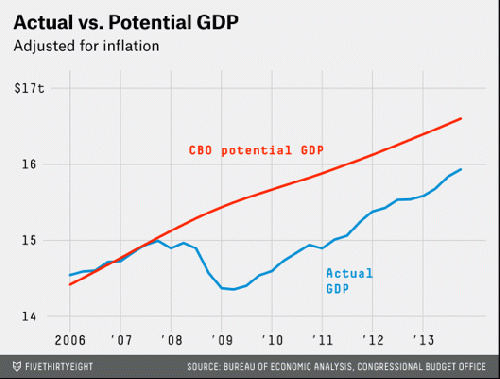An interesting, indicative, yet highly misleading article attempting to rebut the positive Money Multiplier effect of spending on Social Security was recently posted on The Progress Report - http://www.progress.org/the-social-security-non-multiplier. The Progress Report is an online journal mostly promoting Georgist economic solutions, which I generally agree with, but sometimes veering off into pseudo-libertarian and obsolete austerity paradigm economics, which need to be firmly rebutted. The article was by Fred Foldvary, whose bio states:
Fred Foldvary is an economist and has been writing weekly editorials for Progress.org since 1997. Foldvary's commentaries are well respected for their currency, sound logic, wit, and consistent devotion to human freedom. He received his B.A. in economics from the University of California at Berkeley, and his M.A. and Ph.D. in economics from George Mason University. He has taught economics at Virginia Tech, John F. Kennedy University, Santa Clara University, and currently teaches at San Jose State University.
Foldvary is the author of The Soul of Liberty, Public Goods and Private Communities, and Dictionary of Free Market Economics. He edited and contributed to Beyond Neoclassical Economics and, with Dan Klein, The Half-Life of Policy Rationales. Foldvary's areas of research include public finance, governance, ethical philosophy, and land economics.
Foldvary is notably known for going on record in the American Journal of Economics and Sociology in 1997 to predict the exact timing of the 2008 economic depression--eleven years before the event occurred. He was able to do so due to his extensive knowledge of the real-estate cycle.
In other words, Foldvary is a respected and widely cited economist. Here is why I believe he is wrong this time.
Regarding his article on the AARP report of a 2:1 multiplier on payouts - a report which I cited myself in an article on The Progress Report (since removed due to the upgrade at TPR) and on Opednews (http://www.opednews.com/articles/Asking-How-to-pay-for-Soc-by-Scott-Baker-Banking_Social-Security_Social-Security_Social-Security-Cuts-150513-279.html) and in my book "America is Not Broke!" (available on Amazon, etc.), let me take his points one by one:
1. The SS Administration says
The rate of interest on special issues is determined by a formula enacted in 1960.
The rate is determined at the end of each month and applies to new investments in the following month.
The numeric average of the 12 monthly interest rates for 2013 was 1.875 percent. The annual effective interest rate (the average rate of return on all investments over a one-year period) for the OASI and DI Trust Funds, combined, was 3.79 percent in 2013. This higher effective rate resulted because the funds hold special-issue bonds acquired in past years when interest rates were higher.
So, the real ROI as of
2013 was nearly 4%, and it is not correct to say, as he does, "Social
Security pays back about what is put in." In years past, the SS ROI was
>6% and may be again as bond rates climb with interest rate hikes by the
Fed. (Source:
http://www.socialsecurity.gov/OACT/ProgData/fundFAQ.html#a0=2)
Second, he first, correctly, lays out the Keynesian case for how money can be
multiplied in an economy that is not performing optimally, but then he
says "Secondly, in a normal economy (not depressed), savings does not
just sit idle, but is loaned out for borrowers to spend."
This is NOT
the economy we have.
According to the non-partisan Congressional Budget
Office (CBO), we had a trillion dollar per year Output gap through 2013, and
even now, have nearly that much. Or, maybe it still is that much since
the gap has been closed mostly by bending the potential output curve
down instead of bending up the actual output, an ominous sign of lowered
expectations for the economy, perhaps permanent as skills and resources
vanish. See chart below.

The output Gap as measured by the congressional Budget Office
(Image by Five Thirty Eight) Details DMCA
Related to that is who is doing the spending. If it is
retired Seniors then by definition, they will not be returning to work
or engaging in other private sector activities to make up for what they
don't get in Social Security (SS). Even discounting the sorry fate of SS dependents, the Payroll tax may or may not have been put to work
investing in the economy if it isn't used to fund SS, but given the way
another source of monetary fuel, Quantitative Easing (QE), has been spent on asset market
bubbles instead of the real economy, there is no reason to assume it would be. Likely, the
discontinued payroll taxes would fuel asset bubbles, which lead to trickle-down commodity and land inflation, particularly hitting fixed-income
Seniors hardest.
In short, money withdrawn from SS is money withdrawn
from the economy. Savings, if any, by Seniors on SS are not spent
mostly on investment, but on survival.
Reinforcing that is the National Bureau of Economic Research, which says:
Elderly poverty in the U.S. decreased dramatically during the twentieth century.
Between 1960 and 1995, the official poverty rate of those aged 65 and above fell from 35 percent to 10 percent, and research has documented similarly steep declines dating back to at least 1939. While poverty was once far more prevalent among the elderly than among other age groups, today's elderly have a poverty rate similar to that of working-age adults and much lower than that of children.
See the full report here: http://www.nber.org/bah/summer04/w10466.html
(Note: You can view every article as one long page if you sign up as an Advocate Member, or higher).






